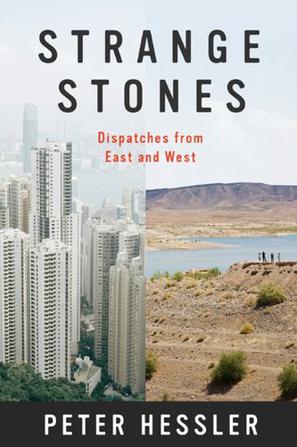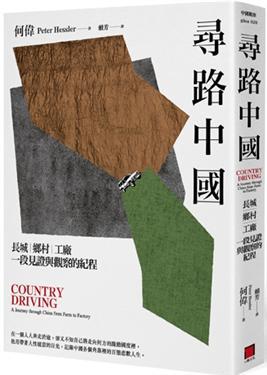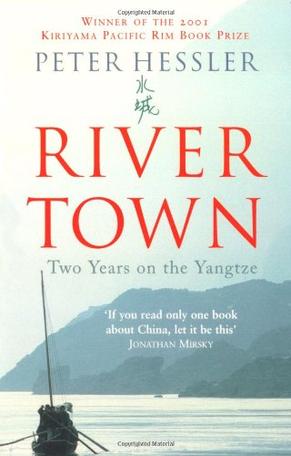-

尋路中國
榮獲2010年度 經濟學人十大好書。 亞馬遜書店百大好書。 紐約時報百大好書。 通過什麼來了解中國?何偉(Hessler)這一次選擇了汽車。嘟嘟--這個紐約客記者租了一部美國產的切諾基吉普車,開始了他的尋路中國之旅。在第一部裡,他選擇了沿古代中國橫貫東西的城牆而行(沒錯,它今天被民族主義和愛國主義者塑造為長城),這裡崎嶇難行,本非道路,古老頹敗的城牆承載了古今殊途的意涵:古代它是中國抵禦胡人的工具,今天抵禦胡人的城堡沒落荒廢,人們沿著新修的路去了南方尋找機會。第二部裡,汽車潮和旅遊熱沿著新開的道路湧向了長城腳下作者居住了二載的一個鄉村,他透過這個叫做三岔的村莊,具體而微地呈現了新興商業力量和傳統政治力量如何左右它,如何左右這裡的村民。第三部裡,他沿著十車道高速公路來到一個個南方雨後春筍般混亂成長的工業城市,圍繞著一台山寨版胸罩調節扣機器發生的諸多有趣故事,他明白了什麼是中國版本的工業革命。還有什麼比這更不可思議呢?一座座山被削平變成了工廠,種植柑橘和小麥的手開始給女人做胸罩,成功就在眼前,如果不沿著路往前走,就無法抵達,而更主要的是,他們已經無法返回。 本書最打動讀者的是對眾生深入到本質的刻畫,何偉真實再現了這個時代裡很多中國人特有的空洞感:周遭變化太快,應接不暇,為之所累,而迅速的變化也帶來了太多的不確定。簡言之,這不是一個關於汽車和道路的故事,而是一部處於瘋狂移動狀態中的國家的浮世繪,更是一部中國如何被莫名快速的力量所驅動和駕馭的深入記錄。是的,在中國,每個人都在路上。 「誰能弄明白這樣一個世界?」 我們向正在努力尋找答案的何偉表示感謝。 -

River Town
In 1996, 26-year-old Peter Hessler arrived in Fuling, a town on China's Yangtze River, to begin a two-year Peace Corps stint as a teacher at the local college. Along with fellow teacher Adam Meier, the two are the first foreigners to be in this part of the Sichuan province for 50 years. Expecting a calm couple of years, Hessler at first does not realize the social, cultural, and personal implications of being thrust into a such radically different society. In River Town: Two Years on the Yangtze, Hessler tells of his experience with the citizens of Fuling, the political and historical climate, and the feel of the city itself. "Few passengers disembark at Fuling ... and so Fuling appears like a break in a dream--the quiet river, the cabins full of travelers drifting off to sleep, the lights of the city rising from the blackness of the Yangtze," says Hessler. A poor city by Chinese standards, the students at the college are mainly from small villages and are considered very lucky to be continuing their education. As an English teacher, Hessler is delighted with his students' fresh reactions to classic literature. One student says of Hamlet, "I don't admire him and I dislike him. I think he is too sensitive and conservative and selfish." Hessler marvels, You couldn't have said something like that at Oxford. You couldn't simply say: I don't like Hamlet because I think he's a lousy person. Everything had to be more clever than that ... you had to dismantle it ... not just the play itself but everything that had ever been written about it. Over the course of two years, Hessler and Meier learn more they ever guessed about the lives, dreams, and expectations of the Fuling people. Hessler's writing is lovely. His observations are evocative, insightful, and often poignant--and just as often, funny. It's a pleasure to read of his (mis)adventures. Hessler returned to the U.S. with a new perspective on modern China and its people. After reading River Town, you'll have one, too. --Dana Van Nest, Amazon.com -

Strange Stones
Full of unforgettable figures and an unrelenting spirit of adventure, Strange Stones is a far-ranging, thought-provoking collection of Peter Hessler’s best reportage—a dazzling display of the powerful storytelling, shrewd cultural insight, and warm sense of humor that are the trademarks of his work. Over the last decade, as a staff writer for The New Yorker and the author of three books, Peter Hessler has lived in Asia and the United States, writing as both native and knowledgeable outsider in these two very different regions. This unusual perspective distinguishes Strange Stones, which showcases Hessler’s unmatched range as a storyteller. “Wild Flavor” invites readers along on a taste test between two rat restaurants in South China. One story profiles Yao Ming, basketball star and China’s most beloved export, another David Spindler, an obsessive and passionate historian of the Great Wall. In “Dr. Don,” Hessler writes movingly about a small-town pharmacist and his relationship with the people he serves. While Hessler’s subjects and locations vary, subtle but deeply important thematic links bind these pieces—the strength of local traditions, the surprising overlap between apparently opposing cultures, and the powerful lessons drawn from individuals who straddle different worlds. -

尋路中國(二版)
你會用什麼方式了解中國? 《紐約客》駐北京記者何偉,選擇以租來的吉普車,駕車穿行,開始他長達五年的尋路中國之旅。 循著長城遺址,他踏上殘存古城牆的沿途村鎮,看到數百年來抵禦胡人的牆磚依舊,但鎮上年輕人早已沿著新鋪築的公路,前往南方尋找機會,獨留老殘幼兒仍在黃褐光禿的故鄉。客居鄉間谷地,在和農村人家共同生活的時日裡,他觀察到傳統政治和新興商業這兩股力量,如何讓一座名為三岔的山村小鎮起了微妙變化,左右了純樸居民的世界。造訪新建廠區,從一座胸罩零件工廠的營運起落間,和與離鄉民工的生活相處中,他見證了中國版本的工業革命,以及自然景觀如何消失在這場巨變裡。 三段寫實幽默、既嘲諷卻又感情豐沛的長期紀錄,時光和文字交織如經緯,何偉以其深入本質的刻劃,構築出平凡小民在現代中國經濟快速起飛、社會急遽變動的時代下的處境。 當今的中國就像一部高速疾駛的車,所有人都是車上乘客;沒有人知道自己將往何處駛去,也沒有人能預知自己會在何時下車;在這個瘋狂移動的國家裡,每個人都在尋夢的路上。對於中國,沒有人走得像他這麼深入,看得如此細膩;何偉捕捉到的,是一幅當代中國如何被莫名快速力量趨駕的浮世百景。 -

River Town
When Peter Hessler went to China in the late 1990s, he expected to spend a couple of peaceful years teaching English in the town of Fuling on the Yangtze River. But what he experienced - the natural beauty, cultural tension, and complex process of understanding that takes place when one is thrust into a radically different society - surpassed anything he could have imagined. Hessler observes firsthand how major events such as the death of Deng Xiaoping, the return of Hong Kong to the mainland, and the controversial consturction of the Three Gorges Dam have affected even the people of a remote town like Fuling. Poignant, thoughtful and utterly compelling, "River Town" is an unforgettable portrait of a place caught mid-river in time, much like China itself - a country seeking to understand both what it was and what it will one day become. -

Country Driving
From the bestselling author of Oracle Bones and River Town comes the final book in his award-winning trilogy, on the human side of the economic revolution in China. In the summer of 2001, Peter Hessler, the longtime Beijing correspondent for The New Yorker , acquired his Chinese driver's license. For the next seven years, he traveled the country, tracking how the automobile and improved roads were transforming China. Hessler writes movingly of the average people—farmers, migrant workers, entrepreneurs—who have reshaped the nation during one of the most critical periods in its modern history. Country Driving begins with Hessler's 7,000-mile trip across northern China, following the Great Wall, from the East China Sea to the Tibetan plateau. He investigates a historically important rural region being abandoned, as young people migrate to jobs in the southeast. Next Hessler spends six years in Sancha, a small farming village in the mountains north of Beijing, which changes dramatically after the local road is paved and the capital's auto boom brings new tourism. Finally, he turns his attention to urban China, researching development over a period of more than two years in Lishui, a small southeastern city where officials hope that a new government-built expressway will transform a farm region into a major industrial center. Peter Hessler, whom The Wall Street Journal calls "one of the Western world's most thoughtful writers on modern China," deftly illuminates the vast, shifting landscape of a traditionally rural nation that, having once built walls against foreigners, is now building roads and factory towns that look to the outside world.